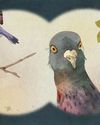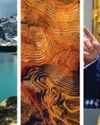Versuchen GOLD - Frei
Art of the Steal
The Walrus
|JanFeb 2024
Why are plundered African artifacts still in Western museums?

IN THE SPRING OF 2022, beneath the dense cover of London's interminably grey sky, two men slipped into the British Museum and headed for the basement. They were dressed in black, wearing hockey masks and carrying nylon bags, as if freshly defected from The Purge franchise. Though some unnerved patrons alerted security guards, nothing could really be done. When the men reached the windowless gallery that houses some of the world's most famous collections of African art, they set about methodically stealing the treasures, one by one. They left through the front doors in broad daylight and emerged into the courtyard triumphant and untouched.
The targets of the operation were the famed Benin Bronzes, a group of sculptures that for centuries adorned the royal palace in the Kingdom of Benin, now located in present-day Nigeria. In 1897, British forces invaded the capital and massacred hundreds of Africans, exiled their leader, bagged everything that looked valuable, then razed the city, including the palace. The masterpieces they transported back to London included thousands of commemorative heads cast in brass, brass plaques, and intricately carved ivory sculptures. These were sacred records of the sovereignty, politics, and history of the Benin kingdom. The officers sold off or gave away many of the pieces upon their return home; these relics are today scattered globally across roughly 150 museums and galleries and some unknown number of private collections. A chunk remain in Britain.
Along with Greece's Elgin Marbles, the Bronzes are the most visible symbol of the movement to return looted heritage to where it came from. The question raised by the caper at the British Museum, perhaps the world's largest beneficiary of stolen art, was simple: If someone robs something from you and you choose to take it back, does it really constitute a crime?
Diese Geschichte stammt aus der JanFeb 2024-Ausgabe von The Walrus.
Abonnieren Sie Magzter GOLD, um auf Tausende kuratierter Premium-Geschichten und über 9.000 Zeitschriften und Zeitungen zuzugreifen.
Sie sind bereits Abonnent? Anmelden
WEITERE GESCHICHTEN VON The Walrus

The Walrus
Even Pigeons Are Beautiful
I CAN TRACE MY personal descent into what science journalist Ed Yong calls “birder derangement syndrome” back to when I started referring to myself as a “sewage lagoon aficionado.
5 mins
September/October 2025
The Walrus
MY GUILTY PLEASURE
BLAME IT ON my love of language, and blame that on my dad—the “it” being my unhealthy need for the stories of P. G. Wodehouse. The witty, wonderful, meandering, wisecracking tales of Jeeves and Bertie; Empress of Blandings (a prize pig) and her superbly oblivious champion, the ninth Earl; Mr. Mulliner; and the rest. Jeeves, the erudite, infallible, not to mention outrageously loyal valet to Bertram Wooster, the quite undeserving but curiously endearing man about town, is likely the most famous of these characters. But they’re all terrific, I assure you.
2 mins
September/October 2025

The Walrus
When It's All Too Much
What photography teaches me about surviving the news cycle
5 mins
September/October 2025

The Walrus
Annexation, Eh
The United States badly needs rare minerals and fresh water. Guess who has them?
10 mins
September/October 2025

The Walrus
We travel to transform ourselves
I grew up in Quebec during the time of the two solitudes, when the French rarely spoke to the English and anglophones could live and work in the province for decades without having to learn a word of French.
4 mins
September/October 2025

The Walrus
How to Win an 18th-Century Swordfight
Duelling makes a comeback
9 mins
September/October 2025

The Walrus
Getting Things Right
How Mavis Gallant turned fact into truth
7 mins
June 2025

The Walrus
Mi Amor
Spanish was the first language I was shown love in. It's shaped my understanding of parenthood
14 mins
June 2025

The Walrus
Odd Woman Out
Premier Danielle Smith is on Team Canada —for now
7 mins
June 2025

The Walrus
My GUILTY PLEASURE
THERE IS NO PLEASURE quite like a piece of gossip blowing in on the wind.
3 mins
June 2025
Translate
Change font size
